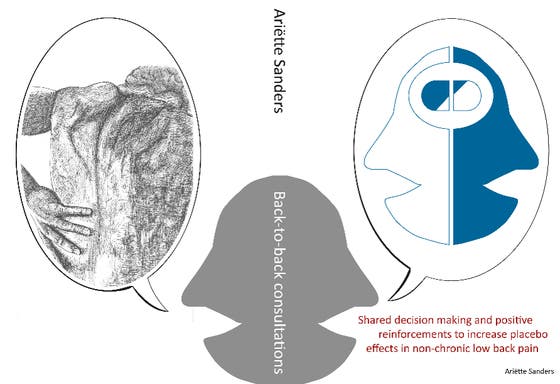'Consultation': Shared decision-making and positive reinforcement to enhance placebo effects in non-long-term lower back pain. What are the effects and why does it remain difficult?

Apart from 'keep moving', no therapy works better against non-long-term low back pain than placebo effects. These effects are partly caused by expectations of doctor and patient, and mutual trust. Shared decision-making requires trust and gives the patient a say. This will make patients' positive expectations about the plan of action more likely to be chosen. Confirmation from the GP can strengthen that confidence. GPs can thus promote recovery from lower back problems.
My PhD research is about shared decision-making in low back pain. From a literature review that we conducted before an intervention study, it is not clear whether patients of general practitioners recover faster if they are more involved in a consultation. However, it turned out that such research is difficult.
For our intervention study 'Consultation', 34 general practitioners have been trained in joint decision-making and in approving the chosen plan of action for patients with non-chronic lower back pain. The 112 patients who were seen in consultation by 25 trained general practitioners did not recover from their back problems faster than the 114 patients who were helped by 22 untrained general practitioners. In 175 video recordings of these consultations, the 23 trained doctors appeared to make better decisions together than the 19 untrained general practitioners, but their 86 patients were given little room to share their considerations. Even if patients or doctors indicated in the questionnaires after the consultation that more shared decision-making had taken place, the low back complaints did not appear to disappear any faster. The costs incurred for healthcare or society did not seem to differ.
We conclude that it appears to be very difficult for doctors to give patients more room to tailor the treatment choice for low back complaints. It may be related to the difficulty that general practitioners experience in deviating from disease-specific treatment guidelines if a therapeutic option does not exceed the placebo effect, even though this placebo effect is demonstrably significant. Their professional attitude could play tricks on them.
